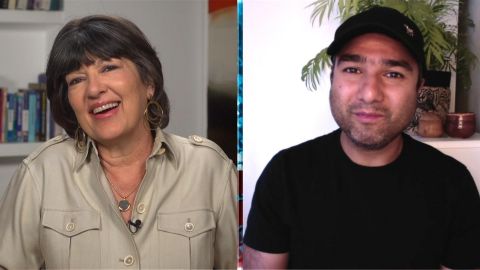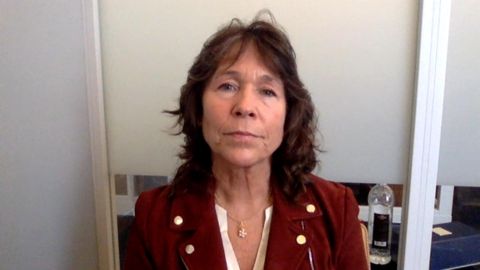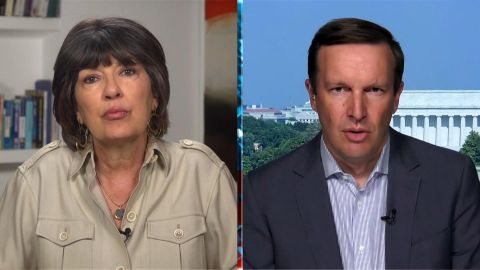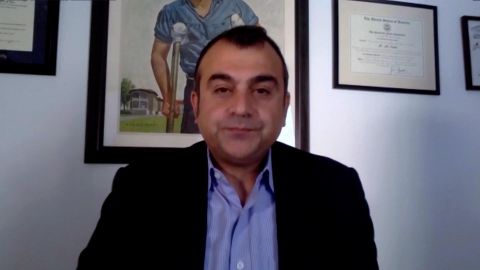Read Transcript EXPAND
CHRISTIANE AMANPOUR: Now, the big question is whether Afghanistan will again become a terrorist safe haven. Few people know more about this than our next guest, Ali Soufan. He is a former FBI special agent who made his name investigating al Qaeda plots before 9/11 and his torture-free interrogation of suspects afterwards. He tells Michel Martin, this terrorism era is far from over and that, potentially, a more dangerous phase has just begun.
(BEGIN VIDEOTAPE)
MICHEL MARTIN: Thanks, Christiane. Ali Soufan, thank you so much for joining us.
SOUFAN: Thank you for having me.
MARTIN: As we are speaking now, the United States has concluded it withdrawal of ground troops from Afghanistan and we are in the vicinity of the commemoration oof the 9/11 attacks. So, 20 years on after all that’s gone on in the last few weeks, is this country safer than it was before?
SOUFAN: Unfortunately, Michel, we went a back full circle. And the world today, I have to say, is more dangerous than it used to be on September 10, 2001. Afghanistan is not the only lawless region controlled by militants who are anti-Americans. If you look at the map today, 20 years after 9/11, we have large swath of land all way from the western shores of Africa to Afghanistan that’s controlled by militias, non-state actors, some of whom are considered terrorists by the International Community and by the United States. And I think this is very dangerous. Now, we have many Afghanistans in Libya, in Yemen, in Somalia, in (INAUDIBLE) region, in Mali and North Nigeria. And the world is way more dangerous than it used to be before, unfortunately, and we need to deal with this reality. We cannot ignore it like we ignored it years and years, like the decade before 9/11. I think if we ignore it, we can ignore only on our perils.
MARTIN: And is this because of the so-called war on terror? Is this sort of metastasizing of the terrorist threat? Is that in part, in your opinion, because of the so-called war on terror?
SOUFAN: Absolutely. It is directly connected to the so-called war on terror. I think, you know, in 2000 — December of 2001, early 2002, I was in Afghanistan as part of the first group that went there in order to, you know, destroy al-Qaeda and their network. And I remember, I was full of hope. The whole world was behind the United States. The Muslim world supported the United States. Everybody was together joined, you know, hand in hand in order to get rid of the evil that murdered more than 3,000 Americans on September 11, 2001. And soon later, we started to see that kind of goodwill fades. You know, at the end of 2002, I remember I was in Kabul and I realize we’re losing the war. We actually lost the war. When al-Qaeda and the Taliban were regrouping in Afghanistan. In the meantime, orders were coming from Washington for special forces, for much needed assets and resources on the ground to move from Afghanistan in order to start preparing for the Iraq war. I think, you know, by then, al-Qaeda and the Taliban were on the verge of defeat, were on the verge of extinction, and we brought them back with our invasion of Iraq, a country that has nothing to do with 9/11, a country that has no WMDs, as we later know. And I think it just send a message to the Muslim world that al-Qaeda and these militants are right, we are there to invade the Muslim world, we are there to steal the resources of the Muslim world. Michel, if you look at the map today, you will see that the United States have no embassy in Libya, we have no embassy in Yemen, we have no embassy in Syria. And now, we have no embassy in Kabul, in Afghanistan ever $2, $3 trillion of spend in Afghanistan. In Iraq, we are forced to tolerate, you know, political leaders who work with Iran and work with Iranian groups that’s considered by the United States terrorist organizations. I think this is a reality that we leave in. This is what the war on terror produced. Unfortunately, the last 20 years, the world saw America at its worse. I think if we need to reclaim our position in the world, we have to start showing the world America as its best.
MARTIN: Was there one fatal error or was it a serious of errors? I mean, do you trace this failure to the decision to move into Iraq or is that really the core of it or was there a series of bad decisions?
SOUFAN: I think the war in Iraq was a pivotal point that shifted the focus on — you know, from al-Qaeda and from the people who attacked us in 9/11 to something that nobody understood around the world, right? And especially in the Muslim world. And then, after that, a lot of the things that happened later. You know, first of all, we have the torture program, right? And this is the United States of America that claim, you know, we fight for freedom, we fight for democracy. Here we are. These is the images of Abu Ghraib, see America. This is the real America. So, I think we started to do a lot of things that violates who we are as a nation, violates our values, violates our moral characters, violates our constitution. We start running wars around the world without understanding the complexity of how the world is. We just wanted to basically go about how we thought the world ought to be. And unfortunately, 20 years later, the events unfolded in Afghanistan, just last week, showed us that we are wrong. We cannot just view every problem in the world as a military problem just because we have the strongest military on earth.
MARTIN: I do want to ask though about the last sort of 20 years. Because these decisions carry through, as you pointed out, through multiple administrations of different political parties. So, I want to start with the George W. Bush administration. Is it your contention that the administration went into Iraq knowing that the premise that they were espousing was a lie? Was it a lie or was it a mistake?
SOUFAN: I think it was a lie. And I think they knew it was a lie. We knew that there is no connection between Saddam Hussein and al-Qaeda, right? We knew that. I remember, you know, when the debate was in headquarters, in FBI quarters about this, the decision was, we told the administration the truth because — and the FBI would present the truth, we don’t present lies to manufacture White House wars, and that was a quote that some people use in headquarters at the time. You know, the information was result torture. They caught a guy, Ibn Sheikh al-Libi, tortured him and because of torture, he told them about the links between al-Qaeda and between Saddam and how both of them are working together on WMD. That information all the way to the United Nation Security Council in the famous Secretary Powell speech. Now, they went back to Ibn Sheikh after we invaded Iraq and we found out that none of it is true. Basically, he said, look, you were torturing me. I gave you what you wanted to hear. That is shocking. That is shocking. You know, you, the administration at the time, wanted to go to invade Iraq and they were trying to find any reason, any source that can tell, yes, there is something in Iraq, so we can justify our invasion. I don’t believe that it was a mistake. I believe it was a colossal lie that resulted in this disastrous adventure in Iraq that destabled (ph) the whole Middle East.
MARTIN: And then, the Obama administration, of which, obviously, the current president, Joe Biden, was a part, was a key part. What was their role in perpetuating this colossal mistake, which was, as you put it, based on a lie?
SOUFAN: We did not realize or the administration did not want to believe the reality on the ground in Afghanistan. We should have left Afghanistan a long time ago. Because, guess what, the Taliban, you know, started to be in control, the Afghan government was nothing but a corrupted group of people that’s pushing the Afghani away from the Afghan government towards the Taliban in so many districts around Afghanistan. The military with the troops that President Obama said did a good job in maintaining the security, creating a secured environment for the diplomats to can engage, to come up with a political solution. Unfortunately, they send the military, they send bullets, but they never send the diplomats or we never had a political strategy on how to move forward. And that is colossal mistake also the Obama administration did when it comes to Afghanistan.
MARTIN: And Trump?
SOUFAN: Oh, my God. I mean, where do you want to start? First of all, negotiating with the Taliban and ignoring the Afghan government send a very bad message. Recognizing the Taliban. Sending his secretary of state to meet with the Taliban leadership in Qatar. And after that, you know, basically saying how the Taliban are smart great people and he wanted to invite them to the White House before 9/11, if you remember. Then, pushing Afghani government to release 5,000 Taliban warriors that basically the Taliban used to take over Afghanistan later on. A lot of these kind of things happened under the Trump administration. So, if you have a bad deal that happened now, it is because of the negotiations and because of what the Trump administration did. But, you know, my criticism of the Obama — of the Biden administration that, you know, if somebody give you a bad deal, you don’t have to take it. You have been in office for a hundred day, more than a hundred days. You know that you want to leave Afghanistan. Start preparing from day one.
MARTIN: Ali, what — given that that you — you presented us a very dire picture. I mean, let’s just be honest about it. I mean, you stay that the terrorism threat, you don’t call it the war on terror, but the threat of terrorism is entering actually a more dangerous phase now for all the reasons you’ve laid out to us. So, what now? What should the Biden administration do now?
SOUFAN: We have a lot of tools in our toolbox. Diplomacy, aid, economy, trade, cultural, you know, engagements. And we need the put all these things together in order to solve, to mount a diplomatic initiative to solve all these conflicts that’s happening around the Middle East. Look at Libya, for example, the United States can do so much to stop the conflict in Libya. All the different factions in Libya reports, you know, either to Qatar or to Turkey or to the UAE or to Saudi Arabia or to France or to Italy, right? All these regional countries are engaged in Libya and all of them are allies to the United States. So, why don’t we start an initiative to solve that problem on Libya because Libya is on the path to be similar to Afghanistan, ruled by non-state actors. Some of these non- state actors are, you know, affiliated with terrorist groups and, you know, violent militias. So, look at the situation in Yemen. We need to find a solution for Yemen. We spend hundreds of billions of dollars in Yemen before on counterterrorism. Today, we don’t even have an embassy over there. And every time we move out from the area, every time we shut down our embassy in an area, somebody else is coming in and taking the vacuum.
MARTIN: So, you are saying more engagement, not less?
SOUFAN: Absolutely, more engagement. I think we always mix engagement and military power. You know, many of these countries have different reasons, cultural, economic, political, sectarian, tribal that’s allowing this conflict to happen in that specific region. In Mali, for example, it has a lot to do with the environment, it has a lot to do with global warming and lack of resources, the lack of water. In Yemen, you can make the argument that, you know, Yemen — Sanaa is running out of water as well. You know, before 9/11, al-Qaeda had 400 pledged member who basically took an oath, gave bay’ ah to Osama bin Laden. 400. Today, al-Qaeda alone is more than 40,000 from (INAUDIBLE) to the horn of Africa, to West Africa, to small groups in Syria, to Afghanistan, to Fata region in Pakistan.
MARTIN: And why is that? Why is that?
SOUFAN: Well, first of all, we never countered the ideology. We never had a program to counter the ideology and the so-called war on terror. Number two, al-Qaeda’s numbers went up when we start seeing all these conflicts happening in the region. Like, for example, in Yemen. A perfect example. Before the war in Yemen, al-Qaeda probably, you know, 800, 900 people. Today, al-Qaeda is about 8,000 people. Now, the 8,000 members of al-Qaeda, I don’t believe all of them are ideologically motivated by the narratives of Osama bin Laden and the views of al-Qaeda of how the world ought to be. But they joined al-Qaeda because their tribes want security. Their tribes want safety. They want protection. They want, you know, resources given to them. And they have no other option. al-Qaeda is the only one on the ground that’s doing these kinds of things. So, that number goes up tremendously.
MARTIN: I mean, we’ve been very focused on Islamic extremist movements, let’s just — as a country. This has been a very big focus. But the fact of the matter is that in the United States in recent years, white ethnonationalist radical movements have engaged in a great deal of violence, have killed many, many people and also seem to have a transnational flavor. Do you see a relationship there between a kind of this rise of — or maybe in the United States, a return of white terrorist movements or white extremist movement, white identity movements? Is there some connection there?
SOUFAN: Absolutely. I mean, Michel, as you know, I’ve, you know, been raising alarm on this for about more than two years. And I testified in Congress about the threat and the similarities between the new transnational white supremacist movement that we see in the United States and its connection to many western capitals and western countries and between the Jihadis and how the white supremacists are learning from Jihadis. You have a white supremacist organization in the states. And now, it is, you know, in many western countries called The Base, literally al-Qaeda. And they use al-Qaeda manuals, they use instructions from inspire magazine to do their what they call white Jihad. You have so many different organizations that’s copying exactly what the Jihadis are doing, learning from Jihadis. You have many white supremacist groups on their chat rooms are praising the Taliban as a conservative movement that defeated the United States and took over Afghanistan because there is nothing these groups would like to do than defeat the government of the United States and have their own version of reality govern all of us. So, this is a very big threat and that add a different dimension to the security matrix that we have to deal with. So, the global Jihadi terrorism is still there, is still alive, and it is still very dangerous and we need to keep our eye on it. But we have also a very dangerous threat in our midst here in the United States. And that threat also transnational. That threat is funded sometimes by even nation states. And I think we need the also keep our eye on it.
MARTIN: You said in one of your pieces recently that we can’t fight domestic terror groups efficiently until the law treats them the way we treat foreign ones. What’s wrong with the way the U.S. approaches domestic terrorism right now?
SOUFAN: Do we even have an approach? I mean, we don’t even have domestic terrorism laws. Soi, if a white supremacist is planning a plot against an African-American church or a Jewish synagogue or a Muslim Mosque, we cannot use the tools that we have to stop al-Qaeda member, right, doing this kind of plot. We don’t have the domestic terrorism laws. So, the only thing they can do is probably charge them on something like violation of the communication act. And only when you have bodies, only when they carry out the attack you can actually charge them with a crime. We don’t have material support charges. We don’t have a lot of the charges that we use in international terrorism. All our terrorism law is tailored for international terrorism, not for domestic terrorism. And in order to focus on the domestic terrorism threat, we have to give tools for law enforcement. Very similar tools to the tools they use to stop al-Qaeda plot or to stop an ISIS plot, you know, to be carried in the United States. And if we don’t have that, unfortunately, we’re going to only be reactive like we used to be before 9/11.
MARTIN: Ali Soufan, thank you so much for talking with us today.
SOUFAN: Thank you, Michel.
About This Episode EXPAND
Chris Murphy; Kori Schake; Ali Soufan; Nick Mohammed
LEARN MORE



